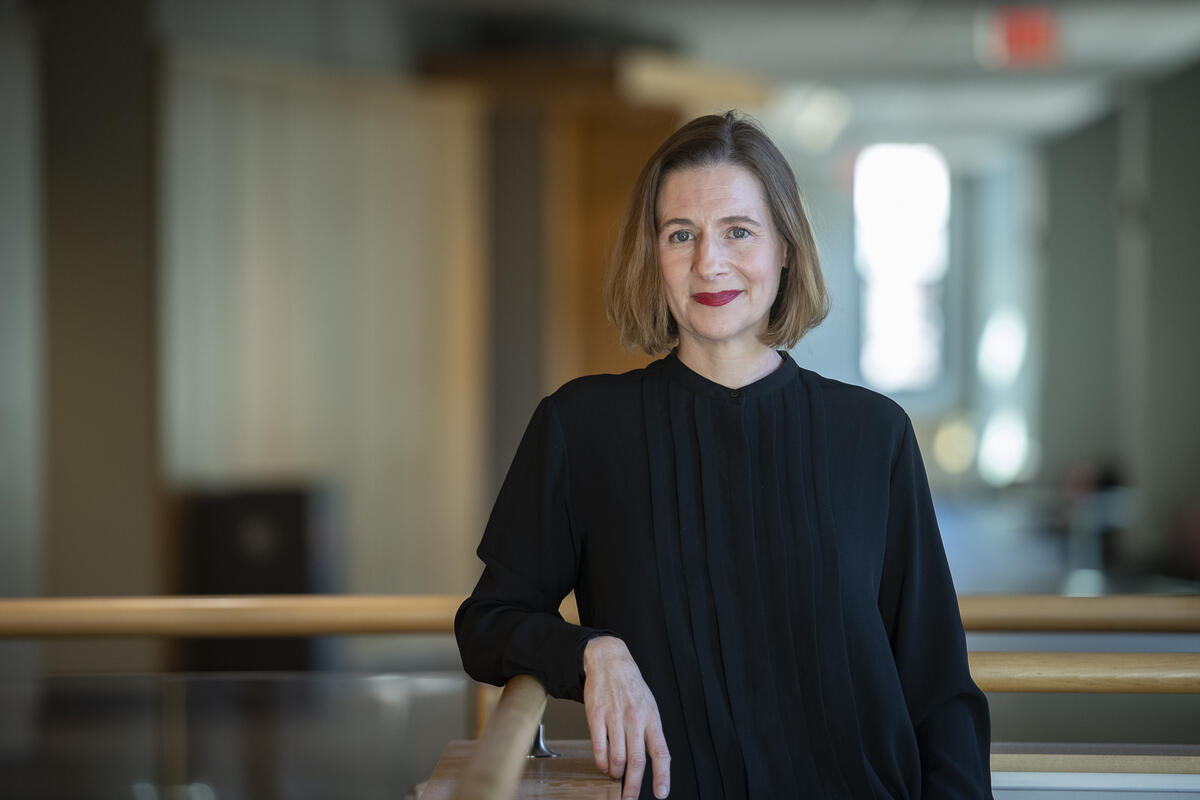
Dec. 18, 2023
VCU doctoral student Kristen Stewart is intrigued by the historical influence of men’s clothing
Share this story
Kristen Stewart never had the desire to look at fashion magazines when she was young, but life took on a new look during her undergraduate years at Virginia Commonwealth University.
“When I took a class on the cultural history of fashion, it was like you served me something I had never had before. I was invigorated,” said Stewart, who went on to earn a degree in fashion design from the School of the Arts in 2002.
Now the Richmond native is back at VCU in the Media, Art and Text doctoral program in the College of Humanities and Sciences, where she is delving into the history of men’s clothing and how masculinity has been defined through fashion.
In returning to school with a renewed focus, Stewart has come full circle in her career. After earning her bachelor’s degree from VCU, she headed to New York and received her master’s in fashion and textile studies at the Fashion Institute of Technology in 2008. An internship at the Metropolitan Museum of Art’s Costume Institute turned into a full-time job, and Stewart began working in the collections department.
“You have to know how to physically care for objects, how to store them properly and manage the data. You have to know from a research perspective what is in the collection,” she said of that role. “I loved the collaboration, but I wanted to do more research and writing. I am so grateful for the time I spent in collections, but eventually I realized I wanted to move into the curatorial side of fashion.”
Stewart went from the Met to the de Young Museum in San Francisco as a curatorial assistant before coming back to Richmond at the Valentine, where she ensured that costumes and textiles in the museum’s collection helped illuminate Richmond history.
“I worked alongside a team of incredible colleagues, and we brought the collection into alignment with the mission,” she said. “After that I realized that I had done as much as I could telling fashion stories in exhibitions using a Richmond history lens. I missed long-form writing, deep investigation. I wanted to explore more universal themes.”
Stewart decided to pursue a doctorate, and her work at the Valentine drew her to VCU’s Media Art and Text program, which she entered in 2020.
“I loved looking at fashion through a social, economic and cultural lens, and I knew the MATX program would enable me to do that beyond the scope of Richmond,” she said.
For one of her classes, Stewart wrote an article about Richmond-based tailor Caspar Wendlinger, a 19th-century Bavarian immigrant who has three military designs in the Valentine’s collection. “Caspar Wendlinger: A Merchant Tailor and the Military in Richmond, Virginia” was published in the spring 2023 edition of Nineteenth Century, the peer-reviewed journal of the Victorian Society in America.
“It was really satisfying to dig deeper on that story than I might have been able to as a busy curator,” she said.
Another one of Stewart’s articles – “It’s Funny Because It’s Feminine: Gender Bias in Depictions of Dress in Puck Magazine (1877-1894)” – was presented at the Association for Education in Journalism and Mass Communication conference in Washington in 2022. Stewart also was featured recently on The Pink State podcast in an episode about fashion and politics.
“My interests center around men’s clothing. I am focused on America and how masculinity is constructed through dress,” she said. “Women recognized that pants were a symbol of power a long time ago and fought for them. I am interested in the other side — those moments when men embraced some of the tenets of women’s wear. Women came after trousers because they are associated with power, but there is great value in softness, comfort and creative expression.”
Stewart said she wants to explore how the imbalanced pursuit of masculine-gendered garments “helps to reinforce the idea that the qualities we associate with men’s clothing are somehow more desirable than those we associate with women’s.”
To better understand how American patriarchal masculinity placed power in pants, her dissertation will delve into American men’s wardrobes (and their musings on dress) from first Colonial contact through the 19th century.
“My research sends me deep down all kinds of interesting rabbit holes in American history,” Stewart said. “Trousers helped shape the construction of masculinity in works of fiction, the visual arts, personal diaries, advertisements, inventories and on and on. When I’m confronted by the centuries-deep entrenchment of this symbol, I can’t help but be inspired watching the pants patriarchy come to pieces in my classroom. So many of my students see right through gendered dress codes and the power structures they support.”
Subscribe to VCU News
Subscribe to VCU News at newsletter.vcu.edu and receive a selection of stories, videos, photos, news clips and event listings in your inbox.










